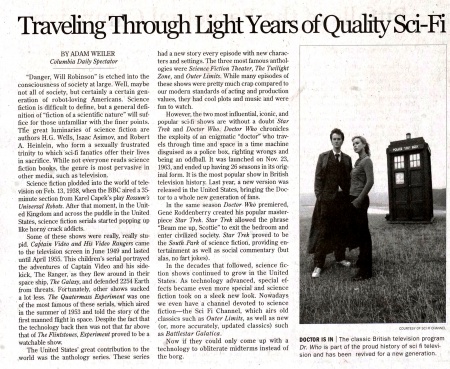Traveling Through Light Years of Quality Sci-Fi
- Publication: Columbia Daily Spectator
- Date: 2007-03-02
- Author: Adam Weiler
- Page: A5
- Language: English
"Danger, Will Robinson" is etched into the consciousness of society at large. Well, maybe not all of society, but certainly a certain generation of robot-loving Americans. Science fiction is difficult to define, but a general definition of "fiction of a scientific nature" will suffice for those unfamiliar with the finer points. The great luminaries of science fiction are authors H.G. Wells, Isaac Asimov, and Robert A. Heinlein, who form a sexually frustrated trinity to which sci-fi fanatics offer their lives in sacrifice. While not everyone reads science fiction books, the genre is most pervasive in other media, such as television.
Science fiction plodded into the world of television on Feb. 13, 1938, when the BBC aired a 35-minute section from Karel Capek's play Rossum's Universal Robots. After that moment, in the United Kingdom and across the puddle in the United States, science fiction serials started popping up like horny crack addicts.
Some of these shows were really, really stupid. Captain Video and His Video Rangers came to the television screen in June 1949 and lasted until April 1955. This children's serial portrayed the adventures of Captain Video and his sidekick, The Ranger, as they flew around in their space ship, The Galaxy, and defended 2254 Earth from threats. Fortunately, other shows sucked a lot less. The Quatermass Experiment was one of the most famous of these serials, which aired in the summer of 1953 and told the story of the first manned flight in space. Despite the fact that the technology back then was not that far above that of The Flintstones, Experiment proved to be a watchable show.
The United States' great contribution to the world was the anthology series. These series had a new story every episode with new characters and settings. The three most famous anthologies were Science Fiction Theater, The Twilight Zone, and Outer Limits. While many episodes of these shows were pretty much crap compared to our modern standards of acting and production values, they had cool plots and music and were fun to watch.
However, the two most influential, iconic, and popular sci-fi shows are without a doubt Star Trek and Doctor Who. Doctor Who chronicles the exploits of an enigmatic "doctor" who travels through time and space in a time machine disguised as a police box, righting wrongs and being an oddball. It was launched on Nov. 23, 1963, and ended up having 26 seasons in its original form. It is the most popular show in British television history. Last year, a new version was released in the United States, bringing the Doctor to a whole new generation of fans.
In the same season Doctor Who premiered, Gene Roddenberry created his popular masterpiece Star Trek. Star Trek allowed the phrase "Beam me up, Scottie" to exit the bedroom and enter civilized society. Star Trek proved to be the South Park of science fiction, providing entertainment as well as social commentary (but alas, no fart jokes).
In the decades that followed, science fiction shows continued to grow in the United States. As technology advanced, special effects became even more special and science fiction took on a sleek new look. Nowadays we even have a channel devoted to science fiction —the Sci Fi Channel, which airs old classics such as Outer Limits, as well as new (or, more accurately, updated classics) such as Battlestar Galatica. Now if they could only come up with a technology to obliterate midterms instead of the borg.
Caption: DOCTOR IS IN The classic British television program Dr. Who is part of the proud history of sci fi television and has been revived for a new generation.
Disclaimer: These citations are created on-the-fly using primitive parsing techniques. You should double-check all citations. Send feedback to whovian@cuttingsarchive.org
- APA 6th ed.: Weiler, Adam (2007-03-02). Traveling Through Light Years of Quality Sci-Fi. Columbia Daily Spectator p. A5.
- MLA 7th ed.: Weiler, Adam. "Traveling Through Light Years of Quality Sci-Fi." Columbia Daily Spectator [add city] 2007-03-02, A5. Print.
- Chicago 15th ed.: Weiler, Adam. "Traveling Through Light Years of Quality Sci-Fi." Columbia Daily Spectator, edition, sec., 2007-03-02
- Turabian: Weiler, Adam. "Traveling Through Light Years of Quality Sci-Fi." Columbia Daily Spectator, 2007-03-02, section, A5 edition.
- Wikipedia (this article): <ref>{{cite news| title=Traveling Through Light Years of Quality Sci-Fi | url=http://cuttingsarchive.org/index.php/Traveling_Through_Light_Years_of_Quality_Sci-Fi | work=Columbia Daily Spectator | pages=A5 | date=2007-03-02 | via=Doctor Who Cuttings Archive | accessdate=15 December 2025 }}</ref>
- Wikipedia (this page): <ref>{{cite web | title=Traveling Through Light Years of Quality Sci-Fi | url=http://cuttingsarchive.org/index.php/Traveling_Through_Light_Years_of_Quality_Sci-Fi | work=Doctor Who Cuttings Archive | accessdate=15 December 2025}}</ref>
